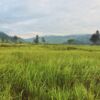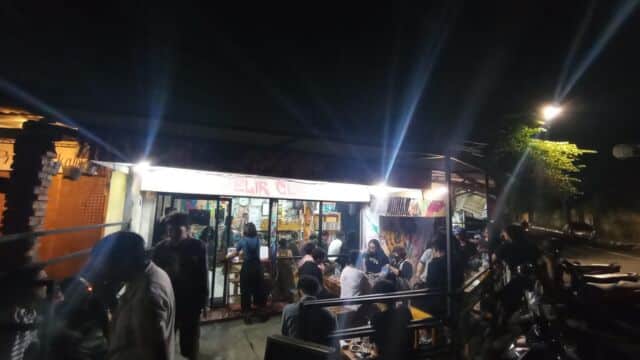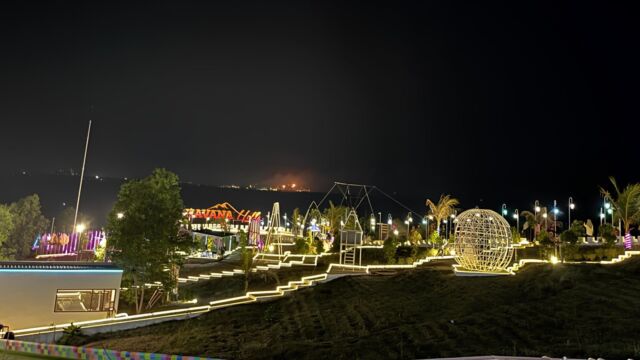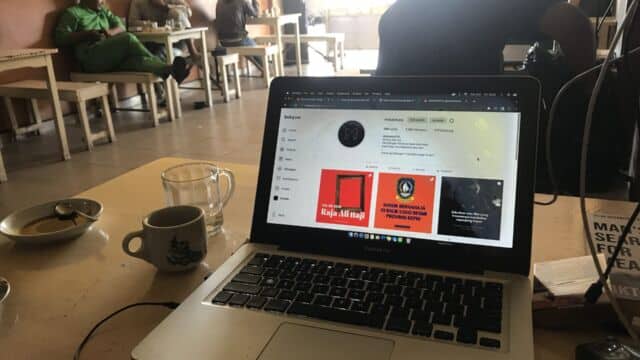I Climbed a Mountain in Java, so Naturally this is a Ghost Story
Photo: Wilda Hikmalia
Mount Slamet | 2,500 words | Translated by Dan Benjamin
That afternoon was filled with the patter of rain. Fog blanketed the vegetable farms spread beneath the mountain’s foothills. From an archway with large lettering announcing ‘Mount Slamet Hiking Gate’, the summit can usually be seen in all its gloriousness, as if calling out and beckoning to trekkers. But not this day. At 2pm, the rain had not stopped.
‘So what do you think?’ asked Mas Tanto, a porter who was to accompany my friends and I. ‘If we wait any longer we’ll be doing most of the walk at night’.
‘Let’s just smash it out, Mas. It’s only a bit of drizzle’, I said, steadfastly. ‘If it gets worse, well, we’ve got rain ponchos. Bismillah’.
‘Okay. So you want to use a motorbike taxi?’
‘Sure do. Straight to Post One, save time’.
It wasn’t without reason that we decided to employ the services of motorbike taxis. It’s better to begin hiking Mount Slamet in the morning, at least if you want to camp at Post Five, a site relatively close to the summit. But my friends and I were only starting now.
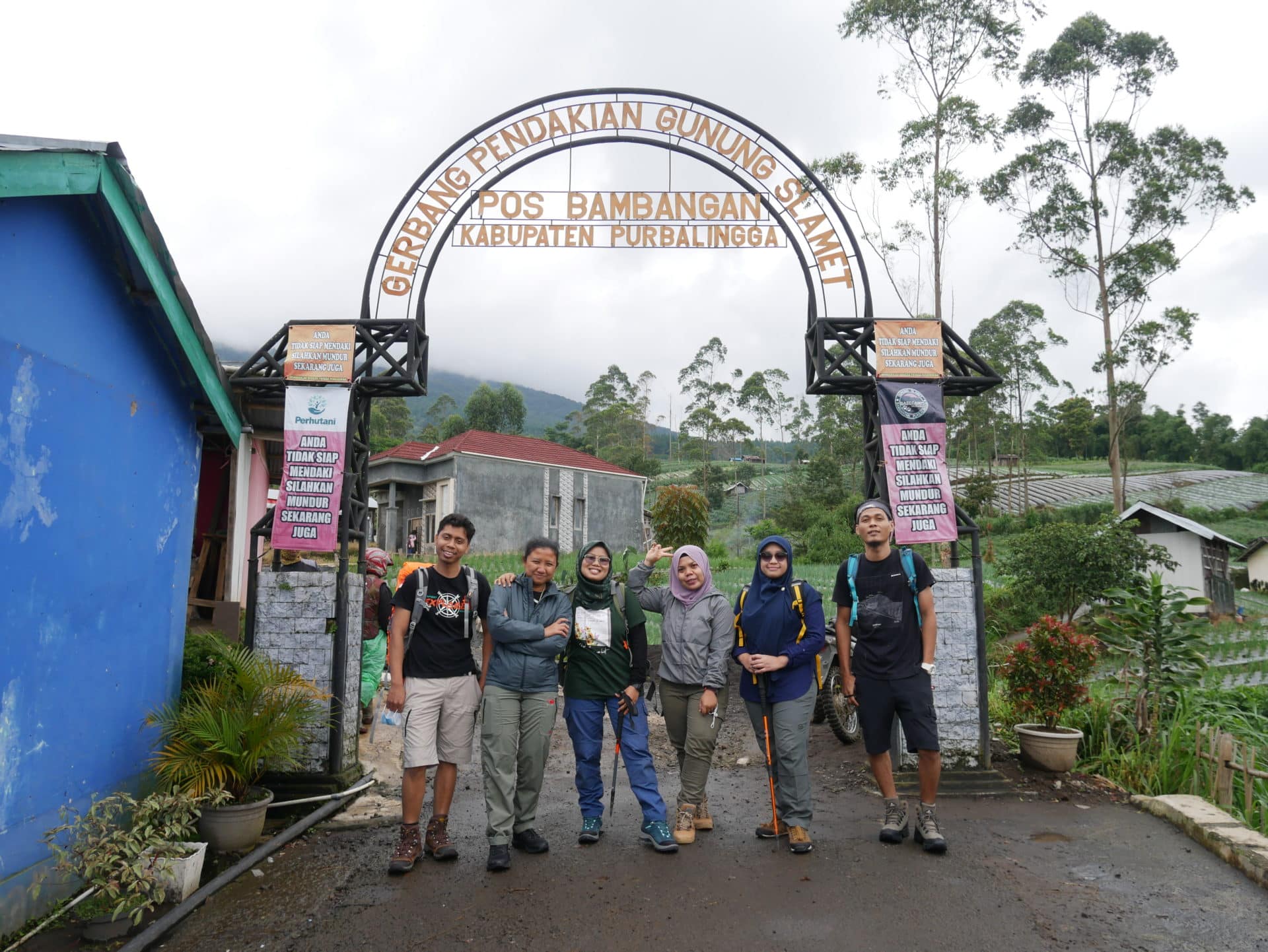
Six motorbikes, whining shrilly, like they were calling out to each other, zipped along a muddy, waterlogged track. Unreal. That muddiness truly made our fifteen-minute motorbike ride up the foothills of Mount Slamet into something crazy. With great ability the bike drivers veered left and right, searching for the safer parts of the track; perched on the back of the bike seats, their passengers held their breath. I silently recited prayers – mouthing the words – for protection and assistance. Crazy. It felt like we were courting death. If you fell, and another motorbike hit you – fatal. It was good that this group of old guys who were our drivers knew the terrain and conditions so well. If rain drowns the entire world, those drivers will take it in their stride.
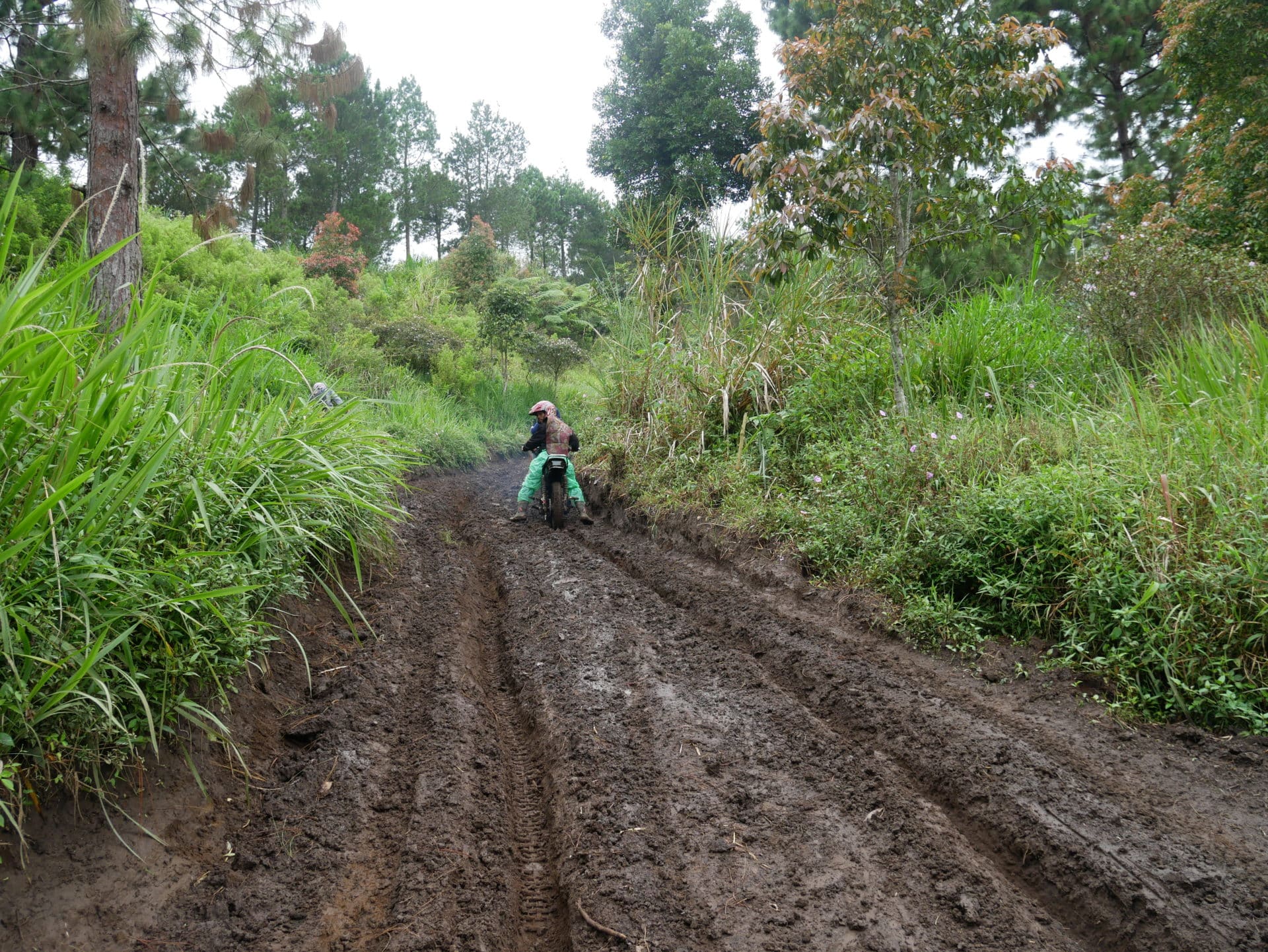
At 2:15 we arrived at the motorbike taxi drop-off point, ahead of Post One. From there the hike started. With determined steps, and full of enthusiasm, my five friends and I walked into the forest.
This was a trek I’d long dreamed about. The highest peak in Central Java and a volcano, Slamet holds a magical allure for all who hope to conquer it. It’s never empty of hikers on weekends, but we were hiking in the middle of the week. There are several different paths up, including the Bambangan Trail via Kabupaten Purbalingga which we had decided on.
One of the highlights of climbing Slamet by this route is Post Four Samarantu, more commonly called Samarantu Gate. Believe it or not, hikers often have experiences there that defy rational explanation. Our group would turn out to be among them.
Because everything was so dripping wet, we decided not to linger at Post One. We just rested a minute to eat some watermelon, a favourite when hiking, then continued to Post Two, then Post Three, arriving there ahead of the Maghrib prayer. Post Three is the recommended spot if you’re doing an overnight hike. But we wanted to continue to Post Five so that later we wouldn’t need to rise at 1 or 2am to reach the summit by sunrise. This meant walking for a couple of hours in the night.
We began preparing what we’d need for night-hiking: torches, headlamps. Then Mas Tanto and the other porters tasked with bringing our gear went on ahead of us.
Darkness was intensifying. Bandaged up in our ponchos, our legs continued to stride, though our breathing started to get heavier. Forest birds were calling out to each other as night replaced day. I felt anxious. From now, our vigilance needed to be raised. We needed to watch over each other and pay attention to how each hiker was going. Focus on the trek itself, think positively, occasionally make airy jokes. There weren’t any other hikers: nobody coming down the mountain, nobody going up. That night we were the last team to be climbing Mount Slamet.
We had agreed to keep together. But Heri seemed overwhelmed as he followed after us.
‘You all go ahead’, he said. ‘Let me and Khair follow’.
‘It’s night-time. Better to stick together’.
‘It’s no problem, you all just go on ahead!’ Khair now backed up Heri. ‘We’ll be right behind’.
From the beginning, Heri had walked slower and trailed behind us. Yet at every post he and Khair, who had accompanied him, had caught up to us eventually. Slowly-slowly, we reasoned: the important thing was not to arrive quickly but to arrive safely.
‘From the start things felt wrong to me. And: there it was. Met up with it at Post Four’, said Hendry flatly.
‘Serious?’ Eka asked. ‘Did you see it as well?’
So we split into two groups. Hendry, Arien, Eka and I went on in front, Khair and Heri behind. Meanwhile Mas Tanto and the porters of course were already way ahead. They wanted to reach Post Five well before us so they could put up the tents and welcome us. We were expected to arrive there at around 8pm.
Actually, part of me quite likes hiking at night. At night the physical fatigue of hiking isn’t worsened by the sight of the trek ahead, like happens during the day. Plus, if the weather is good, and conditions in the forest remain friendly, if you take a short break at night, when you look up, you can see the stars scattered in the bright evening sky. Occasionally, too, you can see below you the lights of peoples’ houses, twinkling away and beautifying further your field of vision. Then, if you close your eyes briefly, you can simply focus on your breath, and listen to the sounds of the night, and give your heart an opportunity to rest a minute.
On the other hand, hiking at night of course requires you to steady your heart, watch your train of thought, and resist getting scared. I didn’t imagine that hiking Mount Slamet that night would involve the supernatural.
We entered Post Four, Samarantu Gate.
We were already applying all our agreed strategies. The distance between Hendry, Arien, Eka and I was not allowed to be too far: if anyone was tired, we all took a break. And, not talking was not permitted. There should be chatting, the topic didn’t much matter – talking was a way to stay focused, to prevent wandering minds. But… I don’t know what happened, but in the middle of one such light chat, I blacked-out.
Suddenly, I felt my arm being pulled by Eka. He dragged me along, got me to sit up, then asked repeatedly:
‘Wilda – are you alright? Is your leg hurt? Your hand? Well?’
‘Huh?’ For a minute I was silent, dazed. Apparently, I had just fallen to my right, losing consciousness for several seconds. Fortunately (yes, there’s still a ‘fortunately’) I hadn’t fallen off the path entirely and down the steep slope. I now felt funny in my left arm, so much so that it was hard to move it, and on my right leg were several abrasions.
I couldn’t believe I had fallen. My gaze had not moved once from the path. My torch had not shone on anything other than the places where I was placing my feet. I was convinced I had been laser-focused in looking where I was going to avoid accidents. How could it be? We did find a tree-root in the spot where I’d fallen over, hidden under green fallen leaves. But I really felt I’d been extremely careful.
We hadn’t browsed the internet for information on Samarantu Gate before our hike. Later, when we did, we found that the exact same thing, an inexplicable fall, had happened to another hiking group – although in that case, another hiker had witnessed the person’s leg being ‘pulled’ down by some force beneath the ground…
Still in the vicinity of Samarantu Gate, we became confused as to which was the correct path.
Our formation at the time was Hendry, Arien, me, then Eka. We were trusting Hendry to find the way because this wasn’t the first time he’d gone up Slamet, so he was familiar with the path.
Entering a section of flatter land, quite narrow, the path forked: one track to the left, one to the right. Hendry took the path to the left. His headlamp flashed. He looked full of certainty. Arien, Eka and I followed. We began approaching a shrubby, bushy section of forest which looked like it rarely saw hikers. I still followed, without suspicion. But then, Hendry suddenly turned around sharply. I was startled.
‘Um, I don’t think this is the way’, he said abruptly.
‘Huh? Are you kidding?’ The words floored me.
‘Don’t joke around’, said Arien.
Hendry shone the torch this way and that, looking for a signpost. Nothing. I exchanged a wordless glance with Arien, on whose face anxiety was visible.
‘So which is it? Where’s the path?’
‘Ah, I’m a little confused guys. I’m not sure…’ Hendry gave this answer whilst shaking his head repeatedly. He looked spooked. He and Eka were continuing to flash their headlamps around.
I started to feel unsettled. As if something was off. But I wasn’t brave enough to probe too much.
*
We finally agreed to retrace our steps. In this atmosphere of disorderliness, we waited for Khair and Heri. Fortunately, they weren’t far behind.
‘What’s going on?’ asked Khair.
‘Hendry. He doesn’t know the way’.
‘Huh? But you’ve been to Slamet a bunch of times. How can you not know the way?’
Hendry didn’t respond. He seemed confused, and kept silent.
Khair looked around, and with conviction said: ‘Lah, this one. Obviously the path: here. Let’s go, let’s go!’
We followed his instructions. He took the path on the right, the one not taken by Hendry.
After that we continued the hike all together, not tolerating any separations.
We reached Post Five around 7pm. From the basecamp to Post Five in five hours felt an achievement, especially given we’d done part of it at night. Straightaway we changed clothes and prepared for dinner.
The dim lights of our torches flashed. Food was taken out of backpacks. Cooking on a mountain with friends is a part of hiking that I long for. Including here at Slamet. Although we’d had some experiences that had made the hairs on the back of my neck stand up, the atmosphere of anxiety that had built up all but disappeared when we gathered to cook. Arien was brewing tea and coffee, Eka and Heri washing vegetables, Hendry and I stood ready in front of the stove, responsible for frying, while Khair was monitoring the rice that was cooking.
I showed my friends the bruises that were appearing, visibly blue, on my right leg.
‘Are you sure you can go to the peak tomorrow?’
‘I can. Inshallah I’ll get there’.
‘If there’s a problem, just get someone to carry you up’. With his jokes Khair made our camp livelier still.
The conversation wandered and wandered, and we even touched on the topic of Hendry who had looked so confused on that Post Four path. But only momentarily. Because – so they say – if you experience strange things on a mountain, you should keep it to yourself, and only reveal it later after you’ve come down again. Nobody quite wanted to probe into the issue too much at this stage.
What had happened earlier didn’t ruin our cook-up. Jokes came thick and fast: there was laughter, not gloominess. From mocking Hendry, to lamenting that the rice still hadn’t cooked, to discussion of intestinal worms. Feelings of togetherness and solidarity are so palpable when climbing mountains: I really like it. Especially if your fellow hikers are cool, awesome, and on the same frequency as you.
We cooked a simple meal, a mainstay soup with potato, carrot, cabbage, beans, and meatballs. Then a couple of side-dishes, fishcakes and nuggets. Aside from this meal Eka had brought along teri kacang, a dish of anchovies, peanuts and chilli smothered in a caramel sauce, and crispy fried potatoes to snack on. And of course, it’s mandatory to have rice: if there’s no rice, it’s not a meal. To warm our stomachs on this night we drank cups of coffee, warm tea, and the bandrek drink, made from ginger, palm sugar and cinnamon, that’s popular in West Java.
Hendry observed, ‘the only thing we’re missing is rendang, yeah’. To me he said, ‘you should have brought rendang’.
‘You’ve got a lot of requests, hey. Finish all of this first’.
‘She says she’s from Padang, but she can’t cook rendang’, Eka joined in. ‘Fake Padang is what you are’.
‘Oh, okay, so it’s two against one, is it? Fine!’
And so it went on: this sort of talk brought us together while we cooked. There were snackers among us: fishcakes and nuggets were barely lifted from the stove before, hmpf, they were eaten straightaway, while the teri kacang and crispy potato were feasted upon without waiting for the main meal and with no feelings of guilt. Then the protestations came, and the food was moved away.
‘Whoa, whoa – wait two minutes, man, wait for the rice to cook first!’
At 10pm, with full stomachs and tired eyes, we agreed to start the hike to the peak tomorrow at dawn. Post Five was quiet. Of the few other hikers, no voices could be heard. It seemed they were already asleep in their sleeping-bags.
At 8:30am the next day, we reached the highest peak in Central Java. We were greeted by bright blue skies, with a sea of lumpy white clouds underneath us. Although there had been a lot of pessimism about the idea of hiking in the rainy season, Alhamdulillah, the universe supported and was with us that day.
It hadn’t been easy. Several times from Post Five to Post Nine I had almost given up. But that’s why it’s useful to have good hiking buddies. When the sentence ‘it’s enough, let’s just stop here’ left my lips, they joined together to implore – let’s go! If one gets to the peak, everyone should get to the peak! If one gives up, nobody goes up! We’re not going to leave Mount Slamet on the to-do list. Let’s go, you can do it! Just a bit more, the peak’s right in front of our noses!

Arriving again at the basecamp, my friends and I hurried to clean ourselves up and re-pack our bags. That night we needed to go back to Jakarta, the next day we would be back to our normal routines.
‘Thank you guys’, I said. ‘The highest peak in Central Java, hey!’
‘It was bad this time, Slamet’, Hendry said. His tone was of quite wonder. He didn’t look at me, just continued packing his clothes into his backpack.
‘It was you who was bad, dude’, said Khair. ‘Usually you have no problem. What happened?’.
‘From the start things felt wrong to me. And: there it was. Met up with it at Post Four’, said Hendry flatly.
‘Huh?’ Eka, who was putting his hiking shoes away, suddenly turned around and looked at Hendry. His pack, which was upright, almost fell over he moved so fast.
‘Serious?’ He asked resolutely: ‘Did you see it as well?’
It turns out that Hendry and Eka had seen a woman, dressed all in white, and with long, unkempt hair, sitting atop a large fallen tree.
Initially they had thought about approaching her to ask about the path.
But then, instantly, she had disappeared.
Hoo!
© Wilda Hikmalia
English translation © Dan Benjamin



